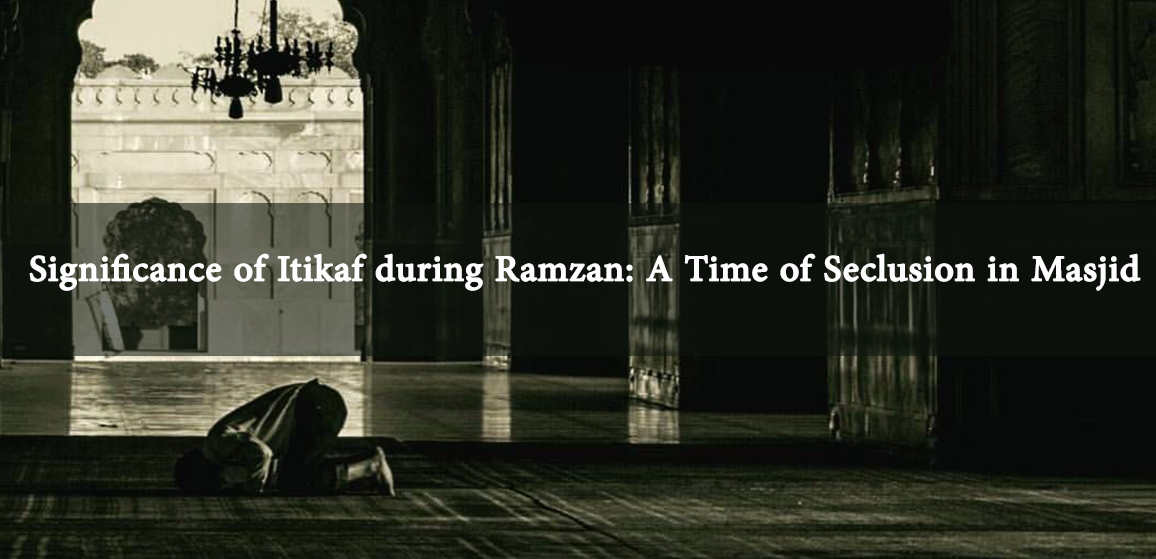 |
| Itikaf is the time of seclusion in Masjid! |
Ramzan is a holy month for Muslims to seek forgiveness and
get closer to Allah (SWT). And this devotion reaches its peak especially in the
last ten days of Ramzan. When the last ten days of Ramzan approach, many Muslims
across the world prepare for Itikaf – a time of seclusion, and prayer with the
sole intention of dedicating your time to the worship of Allah (SWT).
Virtues of Itikaf
The motive behind Itikaf is to disassociate a believer from all
the worldly affairs and distractions so that he can focus solely upon Allah
(SWT) and develop a deeper connection with the Creator.
Itikaf is a Sunnah [a deed recommended by the Holy Prophet
(PBUH)] and it’s a beautiful tradition of the Holy Prophet (PBUH) who practiced
Itikaf all His life.
Hazrat Abu Hurayrah (RA) reported: “The Holy Prophet (PBUH)
used to observe Itikaf every Ramzan for ten days; and in the year in which He
passed away, He observed Itikaf for twenty days.” (Al-Bukhari)
Even much before the Holy Quran was revealed to the Holy
Prophet (PBUH) through Archangel Jibril (Gabriel); He used to retreat in a
mountain cave named Hira in Mecca for meditation.
Women can perform Itikaf just as men can. It is reported that
even after the Holy Prophet (PBUH) passed away; His wives continued practising
Itikaf regularly.
 |
| Itikaf is a Sunnah! |
Rules for Itikaf
A Muslim begins Itikaf after the sunset of 20th of
Ramzan and continues until the sighting of the moon on Eid al-Fitr.
During Itikaf, a Mutakif (one who enters in Itikaf) should stay
in the mosque day and night and is allowed to leave except for using restroom
or do Ghusl (bath for purification) or to attend Jummah prayer. One is allowed
to eat inside the mosque as well. Leaving mosque is permissible only when one
has to attend a Janazah (Islamic Funeral), visit a sick person or attend some other
emergency. Going out of the masjid without a legitimate reason invalidates the
Itikaf. It is recommended to perform Itikaf in a masjid where Jummah prayer is
offered.
Women too can perform Itikaf in a masjid, provided they get
the privacy and necessary facilities. Married women need to obtain consent from
their husbands before performing Itikaf. According to the Hanafi School, it is
permissible for women to do Iitikaf in the prayer room of their home. However, Shafie,
Maliki, and Hanbali Schools consider Iitikaf at home invalid.
 |
| Women too can perform Itikaf in a masjid, provided they get the privacy and necessary facilities! |
Even though Itikaf is highly recommended for Muslims to
perform during the last third of Ramzan; it should not be mistaken for running
away from your responsibilities. Not all Muslims should do Itikaf, but only those
whose circumstances allow them. If Itikaf can affect your family life, work or
harm anyone; it is not at all obligatory to do it in such cases.
Types of Itikaf
There are three types of Itikaf:
Wajib Itikaf: When a Muslim makes a vow to Allah
(SWT) to perform Itikaf upon the fulfilment of a wish; then it becomes Wajib (compulsory) for him to do so.
Itikaf could be for one day and night while fasting or it could be for a number
of days, depending upon your niyyat
(intention).
Sunnah Mu’akkadah: To perform Itikaf during the last
ten days of Ramzan is Sunnah Mu’akkadah`alal-kifayah, i.e. if a Muslim from a
community observe it, the rest will be exempted of this duty. Otherwise all the
Muslims of that area will be held accountable for failing to fulfil this
Sunnah.
Mustahab or Nafl Itikaf: This refers to the Itikaf which can
be performed at any time of the year and for any duration. It is considered to
be a Nafl (voluntary) act. Fasting is not necessary for Nafl Itikaf.
Staying in the masjid for ten days, spending time in the worship
of Allah (SWT), reciting the Holy Quran, seeking forgiveness and blessings –
Itikaf is truly an empowering and spiritually uplifting experience!
Comments
Post a Comment